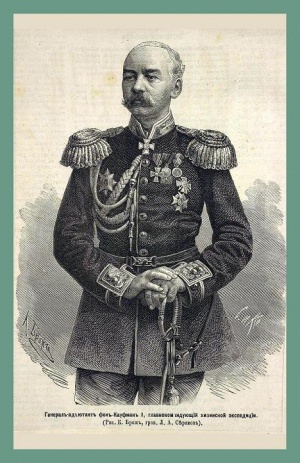Difference between revisions of "Bukhara (Uzbekistan)"
| [unchecked revision] | [unchecked revision] |
GameoAdmin (talk | contribs) (CSV import - 20130816) |
GameoAdmin (talk | contribs) (CSV import - 20130820) |
||
| Line 1: | Line 1: | ||
| − | + | [[File:Konstantin_Von_Kaufman.jpg|300px|thumb|right|''Konstantin von Kaufmann, | |
ca. 1880.Source: | ca. 1880.Source: | ||
| Line 6: | Line 6: | ||
'']] Bukhara (Bokhara; <em>Uzbek</em>: Buxoro viloyati/Бухоро вилояти) was originally a large independent country in [[Soviet Central Asia|Central Asia]]. In 1868 General Konstantin von Kaufmann made the country subject to [[Russia|Russia]]. The chiliastic Mennonites of [[Samara Oblast (Russia)|Samara]] made arrangements with him to settle in his province. When they arrived in [[Kaplanbek (Toshkent Province, Uzbekistan)|Kaplanbek]] in 1880, they encountered difficulties in finding the place they had looked for, namely, where they would escape the "tribulations of the last days" and find complete exemption from military service. Therefore a group moved from Kaplanbek to Bukhara convinced that this was the country which God had prepared for them. They soon found out, however, that they were not welcome and were forced to return to the place from which they had come. After they had repeatedly attempted to force their way into Bukhara and settle there and had each time been forcibly sent back, they finally joined the group of [[Epp, Claas (1838-1913)|Claas Epp]] at [[Ak-Mechet (Uzbekistan)|Ak-Mechet]] in [[Khiva (Khorezm Oblast, Uzbekistan)|Khiva]]. The well-known educator and writer [[Klaassen, Martin (1820-1881)|Martin Klaassen]] died and was buried in Bukhara during one of the attempts to settle in this country. [[Bartsch, Franz (1854-1931)|Franz Bartsch]], the author of <em>Unser Auszug nach Mittelasien</em>, was also in this group. | '']] Bukhara (Bokhara; <em>Uzbek</em>: Buxoro viloyati/Бухоро вилояти) was originally a large independent country in [[Soviet Central Asia|Central Asia]]. In 1868 General Konstantin von Kaufmann made the country subject to [[Russia|Russia]]. The chiliastic Mennonites of [[Samara Oblast (Russia)|Samara]] made arrangements with him to settle in his province. When they arrived in [[Kaplanbek (Toshkent Province, Uzbekistan)|Kaplanbek]] in 1880, they encountered difficulties in finding the place they had looked for, namely, where they would escape the "tribulations of the last days" and find complete exemption from military service. Therefore a group moved from Kaplanbek to Bukhara convinced that this was the country which God had prepared for them. They soon found out, however, that they were not welcome and were forced to return to the place from which they had come. After they had repeatedly attempted to force their way into Bukhara and settle there and had each time been forcibly sent back, they finally joined the group of [[Epp, Claas (1838-1913)|Claas Epp]] at [[Ak-Mechet (Uzbekistan)|Ak-Mechet]] in [[Khiva (Khorezm Oblast, Uzbekistan)|Khiva]]. The well-known educator and writer [[Klaassen, Martin (1820-1881)|Martin Klaassen]] died and was buried in Bukhara during one of the attempts to settle in this country. [[Bartsch, Franz (1854-1931)|Franz Bartsch]], the author of <em>Unser Auszug nach Mittelasien</em>, was also in this group. | ||
| − | |||
| − | |||
= Bibliography = | = Bibliography = | ||
"Konstantin von Kaufmann" in <em class="gameo_bibliography">Meyers Grosses Konversations-Lexikon</em>. | "Konstantin von Kaufmann" in <em class="gameo_bibliography">Meyers Grosses Konversations-Lexikon</em>. | ||
See also bibliography under other articles referred to. | See also bibliography under other articles referred to. | ||
| − | |||
| − | |||
= Maps = | = Maps = | ||
[[Map:Bukhara Province (Uzbekistan)|Map:Bukhara Province (Uzbekistan)]] | [[Map:Bukhara Province (Uzbekistan)|Map:Bukhara Province (Uzbekistan)]] | ||
{{GAMEO_footer|hp=Vol. 1, p. 383|date=1953|a1_last=Krahn|a1_first=Cornelius|a2_last= |a2_first= }} | {{GAMEO_footer|hp=Vol. 1, p. 383|date=1953|a1_last=Krahn|a1_first=Cornelius|a2_last= |a2_first= }} | ||
Revision as of 18:49, 20 August 2013

Bukhara (Bokhara; Uzbek: Buxoro viloyati/Бухоро вилояти) was originally a large independent country in Central Asia. In 1868 General Konstantin von Kaufmann made the country subject to Russia. The chiliastic Mennonites of Samara made arrangements with him to settle in his province. When they arrived in Kaplanbek in 1880, they encountered difficulties in finding the place they had looked for, namely, where they would escape the "tribulations of the last days" and find complete exemption from military service. Therefore a group moved from Kaplanbek to Bukhara convinced that this was the country which God had prepared for them. They soon found out, however, that they were not welcome and were forced to return to the place from which they had come. After they had repeatedly attempted to force their way into Bukhara and settle there and had each time been forcibly sent back, they finally joined the group of Claas Epp at Ak-Mechet in Khiva. The well-known educator and writer Martin Klaassen died and was buried in Bukhara during one of the attempts to settle in this country. Franz Bartsch, the author of Unser Auszug nach Mittelasien, was also in this group.
Bibliography
"Konstantin von Kaufmann" in Meyers Grosses Konversations-Lexikon.
See also bibliography under other articles referred to.
Maps
Map:Bukhara Province (Uzbekistan)
| Author(s) | Cornelius Krahn |
|---|---|
| Date Published | 1953 |
Cite This Article
MLA style
Krahn, Cornelius. "Bukhara (Uzbekistan)." Global Anabaptist Mennonite Encyclopedia Online. 1953. Web. 22 Nov 2024. https://gameo.org/index.php?title=Bukhara_(Uzbekistan)&oldid=75830.
APA style
Krahn, Cornelius. (1953). Bukhara (Uzbekistan). Global Anabaptist Mennonite Encyclopedia Online. Retrieved 22 November 2024, from https://gameo.org/index.php?title=Bukhara_(Uzbekistan)&oldid=75830.
Adapted by permission of Herald Press, Harrisonburg, Virginia, from Mennonite Encyclopedia, Vol. 1, p. 383. All rights reserved.
©1996-2024 by the Global Anabaptist Mennonite Encyclopedia Online. All rights reserved.
